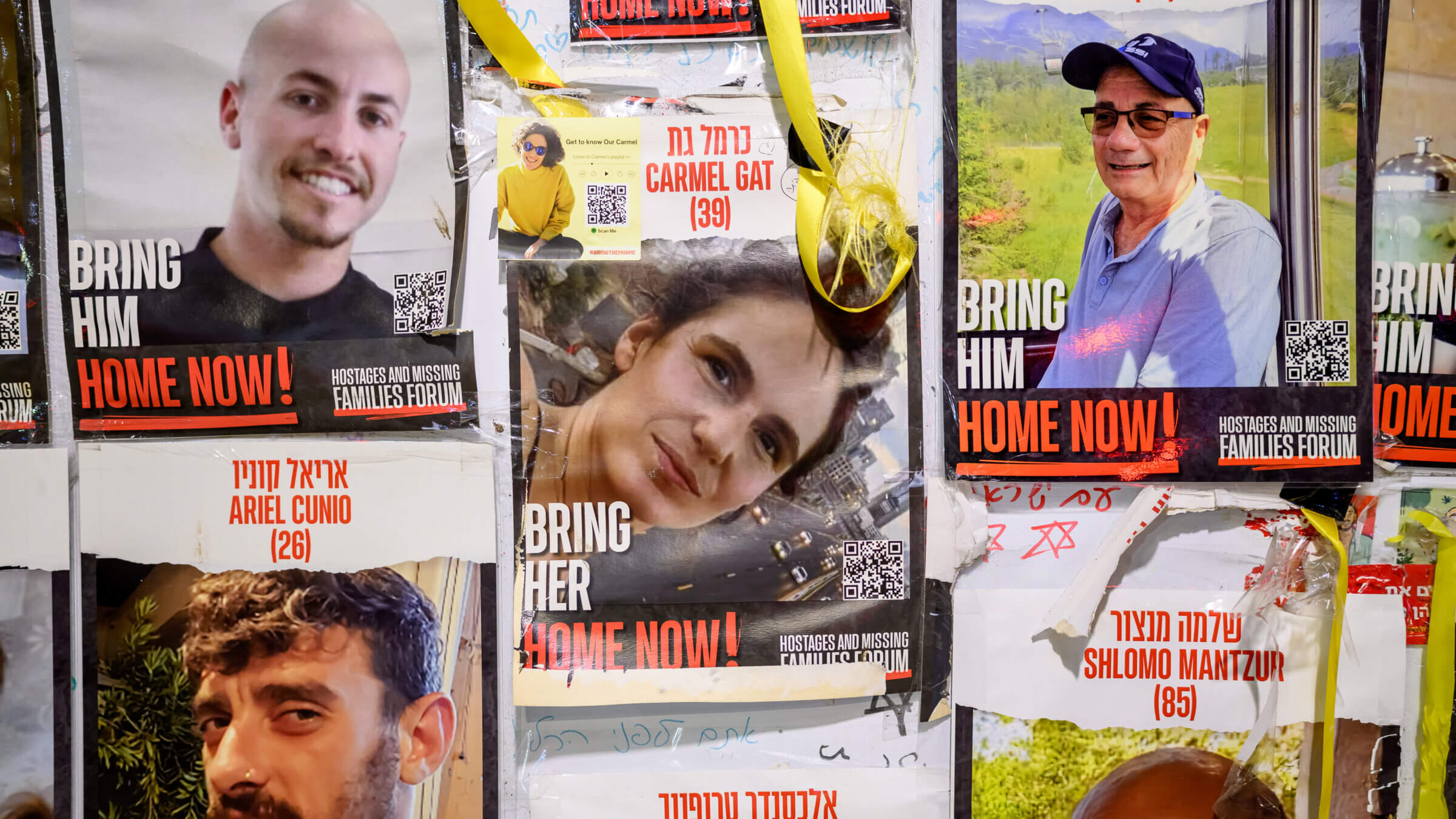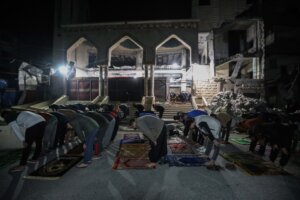A synagogue leased its space to a mosque for Ramadan. It lasted a day.
Fury, resignations and an interfaith partnership shattered after decision to cover up hostage posters causes uproar

Posters of Hamas hostages on a wall at Hostage Square in Tel Aviv. Photo by Roy Rochlin/Getty Images
LOS ANGELES — The connection between Hamakom, a Conservative synagogue in the San Fernando Valley, and the Islamic Society of West Valley, a mosque about 3 miles east of it, dates back before the pandemic. Over the past few years, the rabbi and the imam who lead them would occasionally grab coffee to talk shop, compare notes.
Their bond survived the trauma of Oct. 7 and the war it sparked. Enough that Hamakom, which is looking to downsize, leased its facilities to the Islamic Society for Ramadan to accommodate the mosque’s overflow crowds, with a sale down the line a possibility.
But when the synagogue’s congregants got word that its leadership had covered up the posters of Israeli hostages in the lobby as a courtesy to their Muslim guests — and that the imam had welcomed a controversial speaker — they threatened to resign en masse. Hamakom canceled the lease after a single night, and its co-presidents have stepped down.
“It’s sad to see a lot of effort and time and energy and hope that’s put into formulating partnerships quickly — I don’t want to say dissolve — but it took some steps backward,” Shaykh Suhail Mulla, the mosque’s leader since 2017, said in an interview.
Hamakom’s rabbis, Stewart Vogel and Richard Camras, refused requests to discuss the situation, but issued a brief statement through a crisis public relations outfit, saying their outreach efforts had “fallen short of the high standards of excellence and inclusivity we strive to uphold.”
“Covering up the posters does not reflect Richard or my values, nor the values of our synagogue,” Rabbi Vogel told the Jewish Journal of Greater Los Angeles. “We regret the pain that we have caused the Jewish community, and in particular the Israeli community.”
A gesture backfires
The conflagration comes during a particularly challenging Ramadan because of the humanitarian crisis gripping Gaza, where 30,000 Palestinians have been killed in the war sparked by Hamas’ Oct. 7 attack on southern Israel, and hundreds of thousands are starving. Many interfaith partnerships like the one between Vogel and Mulla have been strained or broken these past months.
Mulla said he was informed in advance that the hostage posters would be covered, which he saw as a meaningful gesture.
“I think the gesture on their end was a gesture of, ‘We recognize that there are triggers for certain individuals in your congregation, and we don’t want to make this about that,’” Mulla said. “‘We want to make this about making you be able to worship in a way in which you feel comfortable.’ It was a gesture that they, on their own, initiated.”
But many Hamakom congregants, when they learned of the gesture, were outraged. Their furious emails to synagogue leadership prompted an email to the community in which Hamakom’s leadership acknowledged that their decision to cover the posters was “made under misguided judgment.”
The email, sent on behalf of the synagogue’s rabbis, co-presidents and executive director, said they had reversed the decision by 4 p.m. on Sunday “but failed to remove the cover promptly.” It also expressed regret for not engaging the community more broadly on leasing out the synagogue for Ramadan.
Mulla said he was unaware of the growing controversy during Sunday evening’s prayer service, which he said drew hundreds of people. His sermon discussed the shared values of Judaism and Islam, drawing on the synagogue’s name, which means “the place” in both Hebrew and Arabic (maqam), to emphasize the religions’ common roots.

A controversial guest
Hussam Ayloush, the executive director of the Los Angeles chapter of the Council of American Islamic Relations, also addressed the crowd. Mulla said he invited Ayloush “because he’s a respected voice in the community who has been there for us on various occasions.”
But Ayloush has drawn fire for comparing Israel to Nazi Germany as he argued that the Jewish state does not have the right to defend itself against Palestinian resistance.
“Imagine we tell Nazi Germany: ‘You have the right to defend yourself against French resistance, or Polish resistance, or Jewish resistance in the Warsaw Ghetto,’” he said in a Dec. 1 speech at the Islamic Center of Greater Oklahoma City. “People would laugh at you if you said that.”
In an interview Thursday, Ayloush stood by his comments. “No country is the same as another country, but we can compare situations,” he said. “I compared situations. If anyone would have accused the brave Jews of Warsaw of terrorism because they are fighting against the German occupation, it would be insane. It would be immoral.”
“Under international law, Israel is an occupier — it’s not an opinion,” Ayloush added. “That does not mean that every attack by the occupied is legitimate. We can still condemn targeting of innocent civilians. But that’s a whole different story.”
His presence at Hamakom fueled the synagogue’s uproar. The Israeli news outlet Ynet reported Wednesday that the synagogue sent a second email to the community citing Alyoush’s speech as the reason the lease was canceled. “We cannot give audience to comments that denigrate Israel’s right to protect itself after October 7th,” it said.
Ayloush said he was saddened that “an exploitation of political issues” had undermined an interfaith partnership.
“What is happening in Gaza, in Palestine, in Israel, pains all of us,” he said. “And for some in the Jewish community who try to, in my opinion, create a wedge between the larger Muslim and Jewish communities on the basis of Muslims sympathizing with the plight of Palestinian people, is very counterproductive.”
Fallout
In a post on the Hamakom website Wednesday, the synagogue announced that co-presidents, Ellen Cervantes and Debbie Strom, had resigned, and an interim president, Paula Russell, had been appointed. The change, it said, “comes in the wake of the challenges and introspection our congregation is currently undergoing.”
The post added that Hamakom, whose campus includes an early childhood center and a religious school, was updating its rental policies “to ensure they align more closely with our values and security requirements, with a commitment to involving community input in future decisions.”
The mosque has moved its Ramadan services to two other rental spaces. Mulla said he does not believe his six-year relationship with Vogel is irreparably broken, and that he’s still interested in purchasing the synagogue someday.
He said he wished that Hamakom congregants could have listened to his speech at Sunday’s service.
“My message was a message of shared roots, of a common set of values that I think are even more important to stand by in a world where morality and religion seem to dwindle day by day,” Mulla said. “I wish that the Jewish community would have had the opportunity to hear that message, so they could understand what this was really about.”




















